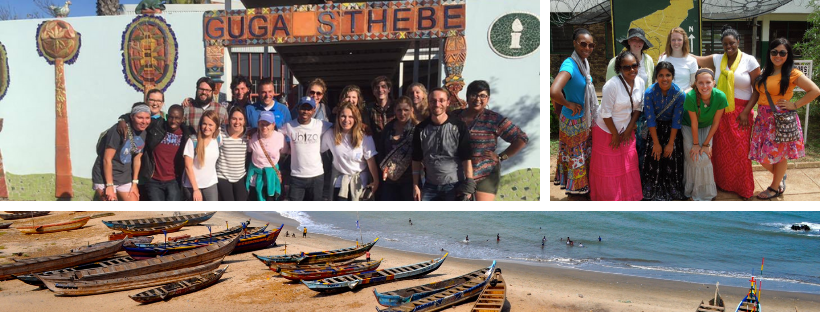Study Abroad

Our program offers a biennial study abroad summer program. As our primary study abroad opportunity, students gain 6 hours of course credit while experiencing the select country through cultural immersion for three weeks in the summer. As a University of Arkansas faculty-led study abroad, this experience is a once-in-a-lifetime opportunity of the classroom brought to life.
In 2018, students traveled to Ghana. The next study abroad opportunity is in South Africa in 2020.
Students who major or minor in African and African American studies are eligible to apply for study abroad scholarship. In addition to our Ghana study abroad, we also support students who are majors/minors in other related study abroad programs. For example, past students have studied the French language and sociopolitical interactions in Cameroon as well as race relations in Italy.
In addition to our Ghana summer program, we are the only program with a Memorandum of Understanding with an African university--the University of Cape Coast (Ghana). This agreement allows for an exchange of students between the University of Arkansas and the University of Cape Coast for semester-long studies.
Memorandum of Understanding
Below is an article from 2011 announcing the Memorandum of Understanding with the University of Cape Coast in Ghana. The Memorandum is still active for students and faculty who wish to study in the West Coast of Africa. Our program also offers a biennial study abroad summer program to Ghana. Students gain 6 hours of course credit while experiencing the country through cultural immersion. As a University of Arkansas faculty-led study abroad, this experience is a once-in-a-lifetime opportunity of the classroom brought to life.
March 1, 2011
University of Arkansas students and faculty will now be able to study at the University of Cape Coast on the West coast of Africa, and students from Cape Coast will take courses at the Fayetteville campus, thanks to a memorandum of understanding recently signed by representatives from both universities.
A delegation consisting of Calvin White, assistant professor of history; Charles Robinson, vice provost for diversity; and William Schwab, dean of the Fulbright College of Arts and Sciences, traveled to Ghana in February to meet with leaders at the University of Cape Coast, which is situated within 10- and 15-minute drives of two major slave castles, dungeons used to house slaves before they were auctioned off and shipped to plantations.
The location, said White, is important for Arkansas students and faculty who want to understand the impact of the slave trade that flourished along the West African coast from the early 1600s to the 1800s. Many of the more than 10 million people who left Africa as slaves landed in colonial America.
“The whole liberal arts department at Cape Coast focuses on the slave trade. It is important for students to dispel myths about Africa as ‘the dark continent.’ By studying in Ghana, they can walk away with a much better understanding of the culture and what in history has created widespread poverty in the country,” said White.
Conversely, students at Cape Coast have many assumptions about America and African Americans. In general, said White, they see America as the land of milk and honey and many know little, if anything, about the American civil rights movement.
The memorandum calls for faculty and student exchanges, for both a semester and the summer. The University of Arkansas is the first school in the Southeast Conference to have a formal agreement with Cape Coast, which as 16,000 students led by the first female chancellor in the country.
The relationship with Cape Coast began during the summer of 2010, when White and Andrea Arrington, assistant professor of history, led a group of students to Ghana in a unique program that immersed students in the culture and often brutal history of Ghana, once the center of the British slave trade.
“This is our first study abroad program to West Africa, a region that has had a profound impact on the history of America,” said Charles Adams, associate dean for international programs in Fulbright College. “It’s certainly true to the vision of Fulbright, an internationalist who understood better than most the effort we must make to be inclusive in how we see the world.”
